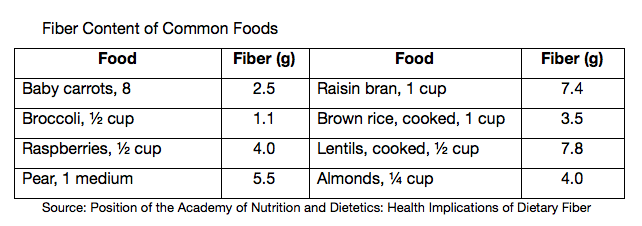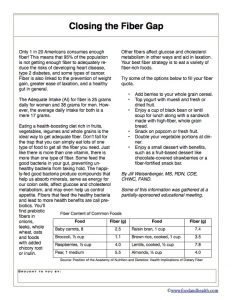Closing the Fiber Gap
Only 1 in 20 Americans consumes enough fiber! This means that 95% of the population is not getting enough fiber to adequately reduce the risks of developing heart disease, type 2 diabetes, and some types of cancer. Fiber is also linked to the prevention of weight gain, greater ease of laxation, and a healthy gut in general.The Adequate Intake (AI) for fiber is 25 grams daily for women and 38 grams for men. However, the average daily intake for both is a mere 17 grams. Eating a health-boosting diet rich in fruits, vegetables, legumes and whole grains is the ideal way to get adequate fiber. Don’t fall for the trap that you can simply eat lots of one type of food to get all the fiber you need. Just like there is more than one vitamin, there is more than one type of fiber. Some feed the good bacteria in your gut, preventing unhealthy bacteria from taking hold. The happily-fed good bacteria produce compounds that help us absorb minerals, serve as energy for our colon cells, affect glucose and cholesterol metabolism, and may even help us control appetite. Fibers that feed the healthy bacteria and lead to more health benefits are call prebiotics. You’ll find prebiotic fibers in onions, leeks, whole wheat, oats and foods with added chicory root or inulin.Other fibers affect glucose and cholesterol metabolism in other ways and aid in laxation. Your best fiber strategy is to eat a variety of fiber-rich foods.Try some of the options below to fill your fiber quota.
Eating a health-boosting diet rich in fruits, vegetables, legumes and whole grains is the ideal way to get adequate fiber. Don’t fall for the trap that you can simply eat lots of one type of food to get all the fiber you need. Just like there is more than one vitamin, there is more than one type of fiber. Some feed the good bacteria in your gut, preventing unhealthy bacteria from taking hold. The happily-fed good bacteria produce compounds that help us absorb minerals, serve as energy for our colon cells, affect glucose and cholesterol metabolism, and may even help us control appetite. Fibers that feed the healthy bacteria and lead to more health benefits are call prebiotics. You’ll find prebiotic fibers in onions, leeks, whole wheat, oats and foods with added chicory root or inulin.Other fibers affect glucose and cholesterol metabolism in other ways and aid in laxation. Your best fiber strategy is to eat a variety of fiber-rich foods.Try some of the options below to fill your fiber quota.
- Add berries to your whole grain cereal.
- Top yogurt with muesli and fresh or dried fruit.
- Enjoy a cup of black bean or lentil soup for lunch along with a sandwich made with high-fiber, whole grain bread.
- Snack on popcorn or fresh fruit.
- Double your vegetable portions at dinner.
- Enjoy a small dessert with benefits, such as a fruit-based dessert like chocolate-covered strawberries or a fiber-fortified snack bar.
By Jill Weisenberger, MS, RDN, CDE, CHWC, FAND.Some of this information was gathered at a partially-sponsored educational meeting.References:AND Position paper: http://www.eatrightpro.org/~/media/eatrightpro%20files/practice/position%20and%20practice%20papers/position%20papers/healthimplicationsfiber.ashxPDF Handout:
